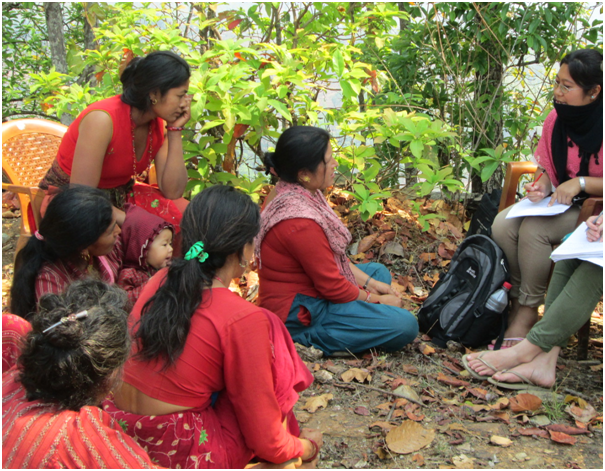Sarala works to build the capacity of citizens to monitor development projects in their local area to ensure that the projects meet the needs of the community. She does this by equipping community monitors with the skills needed to access and use information from government sources about their entitlements and the projects planned for their communities, and to collect data about the delivery of these projects.
This profile is part of a series looking at how data is being accessed and used in developing countries
Sarala’s demand for data and information
“Local people are the ones most vulnerable to injustice and inequality, so strengthening their capacity to use information and speak against misconduct is an important way to set up grounds for social change”.
The current lack of on-the-ground data means it is unclear how much of the funding earmarked for development projects is spent as intended rather than lost through mismanagement or corruption. Sarala works with community groups to ensure they have access to information, are able to monitor the funding, and are able to have an influence in the projects directly affecting them. She uses the information available from the government, together with observational data collected at a local level, to empower citizens with knowledge. Sarala does this by demonstrating what information they have the right to, and more importantly what having that information can mean. CAHURAST has trained 90 community monitors to access information they are entitled to; for example, they have been shown how to gain access to local government budgets and analyse project documents.
Examples of Sarala’s use of information
- Empowering women with information: When Sarala worked with women in the Dhading District she found that many were unaware that 10% of the Village Development Committee budget should have been allocated towards women’s projects – an entitlement which, as a result, often did not reach its intended beneficiaries. CAHURAST helped the women to access the budget data so they could trace government expenditure and determine what they were owed. In one instance NPR 200,000 (about US$2,000) that had been identified as missing was reallocated to sewing training for 18 women, increasing their employment potential.
- Engagement with data using technology: To record the information that was being given by the community monitors, CAHURAST have encouraged the reporting of data through a website application called Development Check. Transforming the way data is collected, stored and communicated has made it more accessible and has stimulated activity around using the information.
- Highlighting discrepancies between project budgets and fund disbursements: In Gorkha district, community monitors trained by Sarala discovered that half of the budget allocated for a road improvement project had not been disbursed. This had stalled the project, which could only be continued using the personal funds of community members. CAHURAST wrote a report about this, shaped by evidence from the community monitors, which put pressure on the local government to resolve the situation and reimburse the funds. Government officials are now more aware that their conduct is exposed to public scrutiny and that citizens have the power to check their actions, which CAHURAST believes will lead to more cautious and effective spending.
Challenges to Sarala having better information
Before the community monitors were trained in data collection approaches, Sarala found that the information gathered was often inaccurate and incomplete, meaning that she had to follow up with the monitors individually. Sarala hopes that the pre-structured questionnaire guiding the entry of information into Development Check will help to improve the data quality.
In her role of collating the project process information, Sarala has often found that the data from the ground does not correlate with the data from the local government. This is because the data from local government lacks detail and disaggregation, preventing its joining up with the citizen generated data. This means that it is harder to check if the intended progress is being made and if the right amount of funding is being provided.
Download this summary as a pdf
Download Sarala Maharjan’s full story
Other case studies in this series
- Using budget data to improve water policy in Nepal
- Using foreign aid data to improve policy making
- Opening public data to improve government transparency in Nepal
- Transforming data into useful information for transparency advocacy in Liberia
- Using public finance data to monitor sub-national resource allocation in Kenya
- Using citizen-generated data to improve school performance in Kenya
- Using project data to improve sexual health services in Kenya
